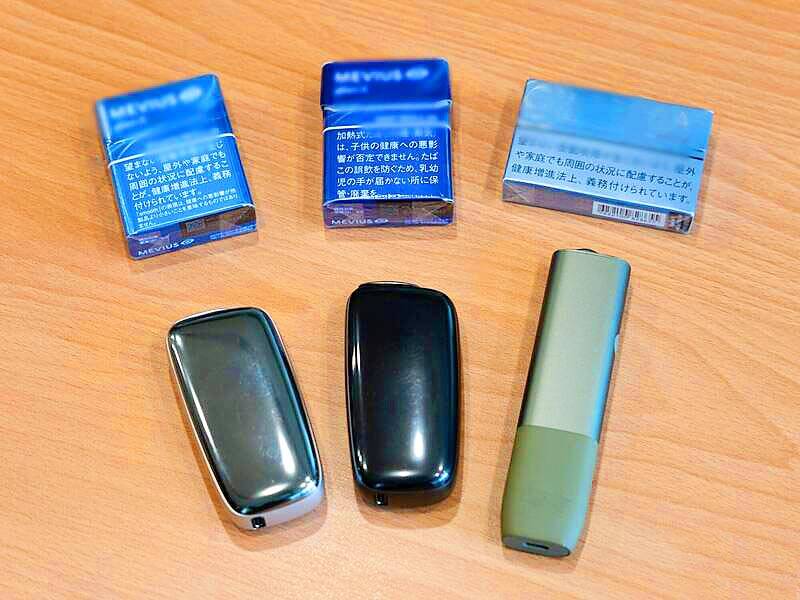Fourteen heated tobacco products from two tobacco companies were conditionally approved after health risk assessment reviews mandated by 2023 amendments to the Tobacco Hazards Prevention Act (菸害防制法), the Health Promotion Administration (HPA) said yesterday.
The conditional approval does not mean that any heated tobacco products people have are immediately legalized, Tobacco Prevention Division Director Lo Su-ying (羅素英) said.
Products would not be considered legal until distributors have received official notice of the decision and have implemented required changes to the labeling and packaging of the products, Lo said.

Photo: Lin Hui-chin, Taipei Times
The two companies were among seven that have applied for inspections, the HPA said.
Stricter controls would be implemented across the board for heated tobacco products, it said.
Specialists subjected the 14 products to toxicology, clinical pharmacology, addiction and public health reviews, and the Ministry of Health and Welfare also inspected them, Lo said.
Conditions under which the products were approved include that young people and pregnant women must be protected from them, and they may not be sold to people younger than 20, she said.
The HPA would monitor sales channels and enforce the regulations, she said.
The companies should contract a third party to monitor and research the products’ impact after they are approved for sale, Lo said, adding that the research must be fully funded and be statistically relevant.
The companies must submit annual reports on heated tobacco product use, as well as rates of abuse, addiction and other risks linked to the use of the approved products, she said.
The HPA must be notified immediately if the companies identify factors that increase the likelihood of addiction, Lo said, adding that any changes to manufacturing processes would require a reassessment of the products.
Labeling must adhere to regulations and marketing should not use misleading terms or phrasings, Lo said.
Contraventions of the conditions or the act would not be tolerated, she said, adding that the HPA would take immediate action, potentially leading to the termination of the approval.
According to the 2023 amendments, electronic cigarettes are generally banned, while heated tobacco products face strict controls.
Heated tobacco products and other similar items can only be sold after they have passed a health risk assessment, the amendments say.
The Customs Administration said yesterday that travelers are still barred from bringing heated tobacco products into Taiwan, even as authorities move forward with conditional approval for commercial imports.
It added that potential changes to personal import rules remain under discussion between government agencies, with no timeline yet provided for a decision.
Customs officials said heated tobacco products seized before March 22, 2023, may be reclaimed within three months of approval, while unclaimed items could be destroyed.
Illegal imports seized after that date will be referred to the local competent authority, the agency added.
Since the law's amendment, the customs agency has confiscated more than 4 million packs of heated tobacco products, it added.
Additional reporting by CNA

The manufacture of the remaining 28 M1A2T Abrams tanks Taiwan purchased from the US has recently been completed, and they are expected to be delivered within the next one to two months, a source said yesterday. The Ministry of National Defense is arranging cargo ships to transport the tanks to Taiwan as soon as possible, said the source, who is familiar with the matter. The estimated arrival time ranges from late this month to early next month, the source said. The 28 Abrams tanks make up the third and final batch of a total of 108 tanks, valued at about NT$40.5 billion

Two Taiwanese prosecutors were questioned by Chinese security personnel at their hotel during a trip to China’s Henan Province this month, the Mainland Affairs Council (MAC) said yesterday. The officers had personal information on the prosecutors, including “when they were assigned to their posts, their work locations and job titles,” MAC Deputy Minister and spokesman Liang Wen-chieh (梁文傑) said. On top of asking about their agencies and positions, the officers also questioned the prosecutors about the Cross-Strait Joint Crime-Fighting and Judicial Mutual Assistance Agreement, a pact that serves as the framework for Taiwan-China cooperation on combating crime and providing judicial assistance, Liang

A group from the Taiwanese Designers in Australia association yesterday represented Taiwan at the Midsumma Pride March in Melbourne. The march, held in the St. Kilda suburb, is the city’s largest LGBTQIA+ parade and the flagship event of the annual Midsumma Festival. It attracted more than 45,000 spectators who supported the 400 groups and 10,000 marchers that participated this year, the association said. Taiwanese Designers said they organized a team to march for Taiwan this year, joining politicians, government agencies, professionals and community organizations in showing support for LGBTQIA+ people and diverse communities. As the first country in Asia to legalize same-sex

MOTIVES QUESTIONED The PLA considers Xi’s policies toward Taiwan to be driven by personal considerations rather than military assessment, the Epoch Times reports Chinese President Xi Jinping’s (習近平) latest purge of the Chinese People’s Liberation Army (PLA) leadership might have been prompted by the military’s opposition to plans of invading Taiwan, the Epoch Times said. The Chinese military opposes waging war against Taiwan by a large consensus, putting it at odds with Xi’s vision, the Falun Gong-affiliated daily said in a report on Thursday, citing anonymous sources with insight into the PLA’s inner workings. The opposition is not the opinion of a few generals, but a widely shared view among the PLA cadre, the Epoch Times cited them as saying. “Chinese forces know full well that